Rotor releases 1x13 hydraulic groupset
All there is to know and where to preorder Rotor's radical new groupset














This article first appeared on BikeRadar.
Rotor has today announced the full prices, specs, weights and availability for all four versions of its 1x13 13-speed hydraulic groupset.
It has also opened up pre-orders for the groupset, with shipping expected to start in April this year.
The highly modular groupset is adaptable for road, mountain, cyclocross and gravel riding, though only drop-bar compatible build kits have been announced so far. The mountain bike version is due to be released in the summer.
As a reminder, please note that the groupset is simply called ‘1x13’ — no catchy names here!
Rotor 1x13 groupset price
Rotor’s all-new 1x13 hydraulic-actuated groupset is priced at €2,599 / £2,299 / $2,800 for the cheapest groupset rising to €4,499 / £3,999 / $4,900 for the top-end version.
Now, before going full keyboard warrior about these admittedly heady prices, note that they are somewhat misleading at first glance.
Get The Leadout Newsletter
The latest race content, interviews, features, reviews and expert buying guides, direct to your inbox!
Both of these prices include everything you need to build your bike with groupset, which includes a wheelset and on the top-end groupset, a power meter.
The inclusion of a wheelset is necessary with the 13-speed versions of the groupset because, as yet, Rotor itself is the only brand so far to offer hubs with the wider-than-normal HG-style freehub required for the 13-speed cassette.
A 13-speed-compatible groupset that ships with a 12-speed cassette is also available. The thinking behind offering this is that a rider can upgrade to a 13-speed cassette once a compatible freehub becomes available for their wheels. This is priced at €1,999 / £1,750 / $2,200.
| Rotor 1x13 groupset kit | Price |
| 1x13 Groupset Kit 2Inpower | €4,499 / £3,999 / $4,900 |
| 1x13 Groupset Kit Super Light | €3,449 / £3,050 / $3,800 |
| 1x13 Groupset Kit | €2,599 / £2,299 / $2,800 |
| 1x13 Ready Groupset Kit 12 Speed | €1,999 / £1,750 / $2,200 |
It’s worth bearing in mind that Rotor is a much smaller company than Shimano, SRAM or Campagnolo and, as the groupset is totally unique, there are no shared components across different generations or tiers of components. This will all contribute to the cost too.
Below is a list of specs and prices for each groupset build available. The groupset includes shifters, brakes, a cassette, a chain, the rear derailleur, rotors and all hardware.
Rotor 1x13 ultimate performance groupset specs
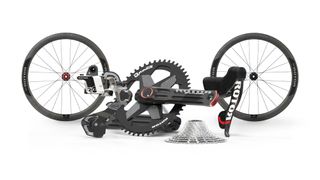
- Rotor 1x13 groupset
- Rotor 2inPower crankset
- Rotor 13-speed carbon wheels
- €3,449 / £3,050 / $3,800
Rotor 1x13 Super Light groupset specs

- Rotor 1x13 groupset
- Rotor Aldhu crankset
- Rotor 13-speed carbon wheels
- €3,449 / £3,050 / $3,800
Rotor 1x13 Adventure groupset specs
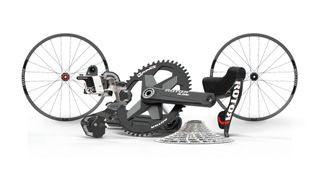
- Rotor 1x13 groupset
- Rotor Aldhu crankset
- Rotor 13-speed alloy wheels
- €2,599 / £2,299 / $2,800
Rotor 1x13 compatible groupset specs
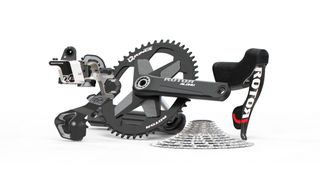
- Rotor 1x13 groupset
- Rotor Aldhu crankset
- €1,999 / £1,750 / $2,200
Rotor 1x13 groupset weights
Rotor gains a truckload of brownie points for supplying a comprehensive breakdown of weights for each component of the 1x13 groupset. Rotor even goes as far as specifying that the weights are for uncut hoses and the sizes of chainrings and disc rotors.
This stuff isn’t rocket science but it’s astounding how few brands actually supply this vital (vital for the pedants among us anyway) information — transparency is in vogue, so other brands, take note here.
Dear cycling industry, why do you suck at weighing and measuring things?
We will, of course, confirm these weights when we receive a groupset in due course, but my gut tells me that these are likely to be quite accurate.
| Rotor 1x13 groupset weights | Weight |
| 1x13 groupset total weight (uncut hoses, 10-36, cassette, uncut chain) | 1,785g |
| Right hand shift/brake set | 863 g |
| Left hand brake set | 443 g |
| 12s Cassette 11-36 / 11-39 | 225 g / 221 g |
| 12s Cassette 11-46 / 11-52 | 282 g / 314 g |
| 13s Cassette 10-36 / 10-39 | 236 g / 241 g |
| 13s Cassette 10-46 / 10-52 | 290 g / 321 g |
| Q RINGS chainring 48t | 131 g |
| 2INpower road cranks (includes axle) | 608 g |
| ALDHU cranks (without axle) | 352 g |
| Standard axle (ALDHU) | 96 g |
| RVOLVER 1x13 rear hub | 246 g |
| RVOLVER 1x13 front hub | 124 g |
| Chain | 269 g |
| Carbon wheels | 1,476 g |
| Aluminium wheels | 1,556 g |
Where to buy Rotor’s 1x13 groupset
You can reserve your very own 1x13 groupset via any Rotor dealer or on Rotorbike.com for a €500 deposit. Shipping is expected to start in April 2019.
Our original story from July 2018 continues below
So why go 13-speed?
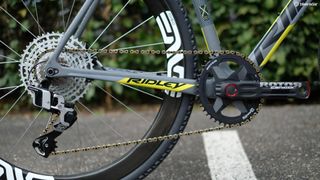
We seem to have only just landed in the 12-speed era, so adding yet another cog will no doubt confuse some, but there’s sound logic behind the decision; although a 2x11 groupset has 22 theoretical ratios, the effective number of usable combinations is usually only 14, due to overlap between different chainring and sprocket combinations. (There are, of course, triple chainsets to consider, but these have fallen out of favour in the mountain bike world and have almost never been used in road racing.)
With that in mind, a 13-speed groupset takes you most of the way to having these 14 useful combinations.
It is, of course, possible to replicate the range of a normal double setup with a 1x12 groupset, but critically, the jumps between will be large. A 13-speed groupset allows for smaller jumps between gears, particularly on smaller-sized, road-focused cassettes.
Why not go 14-speed?
You could be forgiven for wondering why Rotor has not just gone the whole-hog and jumped straight to a 14-speed setup if it would result in the same number of usable gears as a 2x11 groupset.
I can’t speak on the behalf of Rotor, but if this patent from Shimano — filed way back in ’99 and covered by BikeRadar last October — is to be believed, fitting a 14-speed cassette onto a regular freehub body, at least in more compact ratios, would require a radically different chain design.
That the groupset is 13-speed will likely upset many (many who probably won’t buy the groupset, but I digress), so introducing a new chain as well may have actually broken the internet.
Do I have to buy a 13-speed chain now?
You’ll be pleased to hear that as the spacing and size of the cogs is the same as a 12-speed cassette, the new groupset uses a run-of-the-mill KMC X12, 12-speed chain.
What is the range of the 1x13 Rotor groupset?
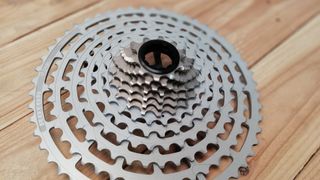
The groupset has a maximum range — with the 10-52t cassette — of 520%. This presents a 1.96% increase compared to Shimano’s recently announced 12-speed 10-51t XTR M9100 (510%) cassette.
As well as the 10-52t cassette, there are also 10-36t, 10-39t and 10-46t cassettes available.
The three smaller cassettes are primarily intended for road/gravel/’cross use, with the largest reserved for mountain bikes. However, it is suggested that the 10-46t may also be useful for those looking for a closer-spaced ratio off-road.
Likewise, if you’re particularly fond of slogging up wall-like alps, there’s also nothing stopping you using the very largest cassette on the road.
While the move to 13-speed is, of course, very interesting, this simple cross-compatibility is what, on paper at least, makes the groupset stand out.
What chainrings are available?
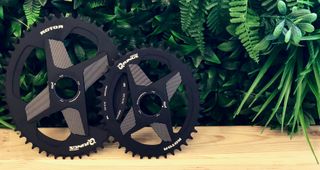
To cover every possibility across all disciplines, chainrings from 38 to 54t are available in two-tooth steps on the road side and 26 to 40t for mountain bikes.
The chainrings will be available as Q-rings — Rotor’s take on oval rings and one of the Spanish brand’s flagship products — as well as regular round rings.
A highly modular design
One of the key highlights of the groupset is the intercompatibility between both road and mountain bike components.
With both Rotor’s UNO and 1x13 groupsets, at the lever end, you’re essentially just operating a hydraulic switch, with the indexing mechanism housed within the derailleur itself.
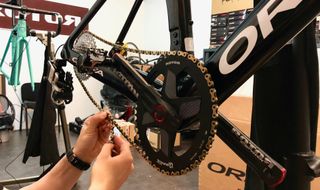
This arrangement meant that designing a shifter for road or mountain bikes is very simple (at least compared to a mechanical groupset, where different pull-ratios between different generations and groupsets complicates matters).
Both a mountain bike and road shifter will be available for the new 1x13 groupset. The road shifters will use the existing Rotor UNO shifters.
A full complement of discipline-specific cassettes and chainrings should mean that the groupset can be adapted to pretty much any use.
Interestingly, the derailleur also features a switch that allows you to convert it to 12-speed, so it will also work with cassettes from SRAM, Shimano, and now, Campagnolo.
Does this mean a new freehub standard?
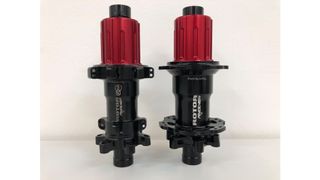
The new 13-speed cassette works with a regular Shimano HG-shaped freehub that has been ever-so-slightly extended and pushed inboard to work with the additional cog.
The limit on a HG-style freehub is usually 11t, so to accommodate the 10t cog, this now sits slightly outboard from the freehub, with a special lock ring developed to work with this setup.
While Rotor will only offer the freehub on its Rvolver hubs to start with, the freehub is an ‘open standard’, so other manufacturers are free to develop their own hubs with the new design.
What about the weight and price?
At the time of writing, we don’t have the claimed weights or pricing, but Rotor ensures us that these are on route.
How is it likely to perform?
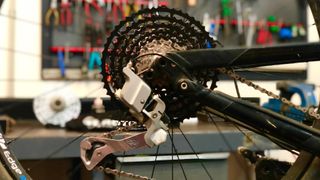
All have been impressed by the performance of the rear shifting on this first-generation group, but most have found the front derailleur to be a little less refined feeling and vague compared with a mechanical or Di2 equivalent.
Ditching the front mech makes the whole groupset seem more viable, particularly as the hydraulic actuation presents genuine advantages — compared to a mechanical groupset, we’ve found the closed system hydraulics to require next to no maintenance, and unlike an electronic groupset, it doesn’t require charging. In-line adjusters on the shifter’s hoses also permit the ability to customise the feeling or weight of shifts, which remains a unique feature.
Who is going to use this groupset?
If I’m to believe Rotor, the UNO groupset has seen uptake that surprised even Rotor, with the majority of buyers primarily driven by the desire to have something different to the majority of other cyclists.
It’s almost a given that the groupset is going to be expensive, but there have been plenty of rumblings that a number of other small manufacturers are well on the way to — or are at least considering — entering the groupset market. This suggests there is a real demand from the high-end market for something different from the big three.

Thank you for reading 5 articles in the past 30 days*
Join now for unlimited access
Enjoy your first month for just £1 / $1 / €1
*Read any 5 articles for free in each 30-day period, this automatically resets
After your trial you will be billed £4.99 $7.99 €5.99 per month, cancel anytime. Or sign up for one year for just £49 $79 €59

Join now for unlimited access
Try your first month for just £1 / $1 / €1